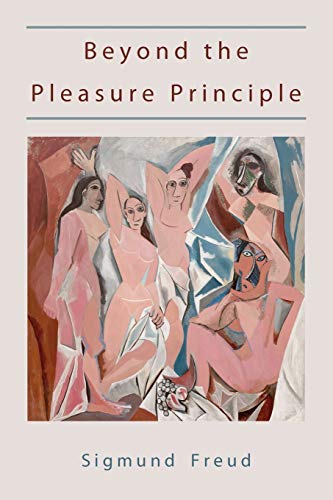Artículos relacionados a Beyond the Pleasure Principle-First Edition text.

Sinopsis
2009 reprint of 1922 edition. Beyond the Pleasure Principle marked a turning point and a major modification of Freud's previous theoretical approach. Before this essay, Freud was understood to have placed the sexual instinct, Eros, centre stage, in explaining the forces which drive us to act. In 1920, going "beyond" the simple pleasure principle, Freud developed his theory of drives, by adding the death instinct, often referred to as Thanatos, although Freud himself never used this term.The main importance of the essay resides in the striking picture of human beings struggling between two opposing instincts or drives: Eros working for creativity, harmony, sexual connection, reproduction, and self-preservation; Thanatos for destruction, repetition, aggression, compulsion, and self-destruction. Freud also took the opportunity to state the basic differences, as he saw them, between his approach and that of Carl Jung, and covered the history so far of research into the basic drives.
"Sinopsis" puede pertenecer a otra edición de este libro.
Reseña del editor
2009 reprint of 1922 edition. Beyond the Pleasure Principle marked a turning point and a major modification of Freud's previous theoretical approach. Before this essay, Freud was understood to have placed the sexual instinct, Eros, centre stage, in explaining the forces which drive us to act. In 1920, going "beyond" the simple pleasure principle, Freud developed his theory of drives, by adding the death instinct, often referred to as Thanatos, although Freud himself never used this term.The main importance of the essay resides in the striking picture of human beings struggling between two opposing instincts or drives: Eros working for creativity, harmony, sexual connection, reproduction, and self-preservation; Thanatos for destruction, repetition, aggression, compulsion, and self-destruction. Freud also took the opportunity to state the basic differences, as he saw them, between his approach and that of Carl Jung, and covered the history so far of research into the basic drives.
"Sobre este título" puede pertenecer a otra edición de este libro.
EUR 17,21 gastos de envío desde Estados Unidos de America a España
Destinos, gastos y plazos de envíoComprar nuevo
Ver este artículoEUR 2,31 gastos de envío desde Reino Unido a España
Destinos, gastos y plazos de envíoResultados de la búsqueda para Beyond the Pleasure Principle-First Edition text.
Beyond the Pleasure Principle-First Edition text.
Librería: Rarewaves.com UK, London, Reino Unido
Paperback. Condición: New. Nº de ref. del artículo: LU-9781578988457
Cantidad disponible: Más de 20 disponibles
Beyond the Pleasure Principle-First Edition text.
Librería: Rarewaves USA, OSWEGO, IL, Estados Unidos de America
Paperback. Condición: New. Nº de ref. del artículo: LU-9781578988457
Cantidad disponible: Más de 20 disponibles
Beyond the Pleasure Principle-First Edition text.
Librería: Rarewaves USA United, OSWEGO, IL, Estados Unidos de America
Paperback. Condición: New. Nº de ref. del artículo: LU-9781578988457
Cantidad disponible: Más de 20 disponibles
Beyond the Pleasure Principle-First Edition text.
Librería: Rarewaves.com USA, London, LONDO, Reino Unido
Paperback. Condición: New. Nº de ref. del artículo: LU-9781578988457
Cantidad disponible: Más de 20 disponibles
Beyond the Pleasure Principle-First Edition Text. (Paperback or Softback)
Librería: BargainBookStores, Grand Rapids, MI, Estados Unidos de America
Paperback or Softback. Condición: New. Beyond the Pleasure Principle-First Edition Text. 0.34. Book. Nº de ref. del artículo: BBS-9781578988457
Cantidad disponible: 5 disponibles
Beyond the Pleasure Principle-First Edition text.
Impresión bajo demandaLibrería: AHA-BUCH GmbH, Einbeck, Alemania
Taschenbuch. Condición: Neu. nach der Bestellung gedruckt Neuware - Printed after ordering - 2009 reprint of 1922 edition. Beyond the Pleasure Principle marked a turning point and a major modification of Freud's previous theoretical approach. Before this essay, Freud was understood to have placed the sexual instinct, Eros, centre stage, in explaining the forces which drive us to act. In 1920, going 'beyond' the simple pleasure principle, Freud developed his theory of drives, by adding the death instinct, often referred to as Thanatos, although Freud himself never used this term.The main importance of the essay resides in the striking picture of human beings struggling between two opposing instincts or drives: Eros working for creativity, harmony, sexual connection, reproduction, and self-preservation; Thanatos for destruction, repetition, aggression, compulsion, and self-destruction. Freud also took the opportunity to state the basic differences, as he saw them, between his approach and that of Carl Jung, and covered the history so far of research into the basic drives. Nº de ref. del artículo: 9781578988457
Cantidad disponible: 1 disponibles
Beyond the Pleasure Principle-First Edition Text.
Librería: GreatBookPrices, Columbia, MD, Estados Unidos de America
Condición: New. Nº de ref. del artículo: 7739251-n
Cantidad disponible: Más de 20 disponibles
Beyond the Pleasure Principle-First Edition Text.
Librería: GreatBookPrices, Columbia, MD, Estados Unidos de America
Condición: As New. Unread book in perfect condition. Nº de ref. del artículo: 7739251
Cantidad disponible: Más de 20 disponibles
Beyond the Pleasure Principle-First Edition Text.
Librería: GreatBookPricesUK, Woodford Green, Reino Unido
Condición: New. Nº de ref. del artículo: 7739251-n
Cantidad disponible: Más de 20 disponibles
Beyond the Pleasure Principle-First Edition Text.
Librería: GreatBookPricesUK, Woodford Green, Reino Unido
Condición: As New. Unread book in perfect condition. Nº de ref. del artículo: 7739251
Cantidad disponible: Más de 20 disponibles

